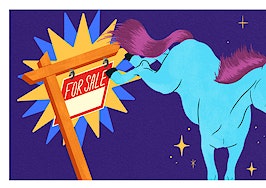A controversial ban on pocket and off-market listings that was approved last year is going to bolster trust and cooperation in the industry, and will be a boon to consumers, two industry leaders told a packed room Thursday afternoon.
Brian Donnellan, president and CEO of the massive multiple listing service Bright MLS, said during Inman Connect New York that pocket listing bans have positive impacts in three areas: competition, consumers and cooperation. By requiring agents to put all of their properties into their respective multiple listing services (MLSs), in other words, both real estate industry members and their clients have better access to the market.
“We believe that this has a huge impact on consumers,” Donnellan said. “We think that if a consumer can go to one place and get all the information, they’re better served.”

Brian Donnellan at Inman Connect New York. Credit: AJ Canaria of PlanOmatic / Inside Real Estate
Drussy Hernandez agreed. Hernandez is a vice president of development at Fulton Grace Realty in the Chicago area, and argued that “sellers are going to benefit from having that exposure.”
“We need to remember who we work for,” she added. “Who do we owe our duty to? I think it’s an advantage for everyone involved.”
Both Donnellan and Drussy were members of a panel discussion titled “Implementing Policy 8.0.” The session title refers specifically to the Clear Cooperation Policy, a rule that the National Association of Realtors (NAR) overwhelming approved in November.
The policy requires agents to input listings into an MLS within one day of marketing them. That means it bars agents from promoting houses on websites or email lists, for example, for days or weeks — a practice some observers said had previously been on the rise. The rule consequently is often referred to colloquially as a pocket listing ban, though it also applies to listings that never would have made it to an MLS at all.
Though both Donnellan and Hernandez expressed support for the policy Thursday, not everyone in the industry has been so enthusiastic. In October, a pair of high-profile agents criticized the rule, and executives were divided on the issue.
Bright MLS has nevertheless been a leader in driving pocket listings out of the industry. Thursday, Donnellan noted that his organization implemented its own policy — modeled on, but implemented before, NAR’s version — and that $5,000 fines for violations begin on Saturday.
Bright MLS‘s version of the policy has also sparked an acrimonious fight between it and Compass. Discount franchisor Assist-2-Sell has also been critical of Bright MLS’s rule.
Despite that conflict, Bright MLS has in recent months been working on educating members. Donnellan said Thursday that his organization has worked to “make sure we were answering every question that was out there.” And from that process, Donnellan said that the majority of the industry is on board with the rules, while only a tiny minority of agents have specific concerns.
“We spend about 95 to 97 percent of the time talking about the 1 percent,” Donnellan explained, adding that some trepidation appears to have been overinflated.
For agents who aren’t part of Bright MLS, NAR’s version of the policy technically went into effect this month but has an implementation deadline of May 1. That means the numerous trade organizations around the U.S. have several more months to educate agents and build the technology to enforce the rule.

Drussy Hernandez at Inman Connect New York Thursday. Credit: AJ Canaria of PlanOmatic / Inside Real Estate
According to Drussy, that timeline means now is the time for agents to “get involved” and “go out and find out what your MLS is doing.” However in any case, she also believes the broader turn away from pocket listings that NAR’s policy represents is a good thing for the real estate industry.
“It was a win-win all the way around,” she argued.
Donnellan concurred, saying that the last several months have “been kind of exciting” as Bright MLS has worked to implement its version of a pocket listing ban. He also reiterated his stance that such policies are good for both industry insiders and the consumers they serve.
“We’re doing what’s right,” he said. “This is the foundation: that you cooperate entirely, not just when you want to. I think it puts us in the right place, and I think it’s good for us all.”













